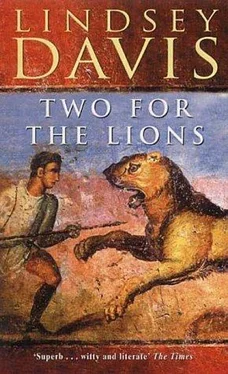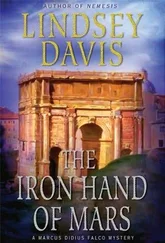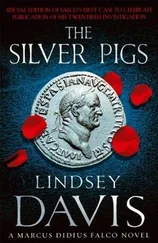Lindsey Davis - Two For The Lions
Здесь есть возможность читать онлайн «Lindsey Davis - Two For The Lions» весь текст электронной книги совершенно бесплатно (целиком полную версию без сокращений). В некоторых случаях можно слушать аудио, скачать через торрент в формате fb2 и присутствует краткое содержание. Жанр: Исторический детектив, на английском языке. Описание произведения, (предисловие) а так же отзывы посетителей доступны на портале библиотеки ЛибКат.
- Название:Two For The Lions
- Автор:
- Жанр:
- Год:неизвестен
- ISBN:нет данных
- Рейтинг книги:5 / 5. Голосов: 1
-
Избранное:Добавить в избранное
- Отзывы:
-
Ваша оценка:
- 100
- 1
- 2
- 3
- 4
- 5
Two For The Lions: краткое содержание, описание и аннотация
Предлагаем к чтению аннотацию, описание, краткое содержание или предисловие (зависит от того, что написал сам автор книги «Two For The Lions»). Если вы не нашли необходимую информацию о книге — напишите в комментариях, мы постараемся отыскать её.
Two For The Lions — читать онлайн бесплатно полную книгу (весь текст) целиком
Ниже представлен текст книги, разбитый по страницам. Система сохранения места последней прочитанной страницы, позволяет с удобством читать онлайн бесплатно книгу «Two For The Lions», без необходимости каждый раз заново искать на чём Вы остановились. Поставьте закладку, и сможете в любой момент перейти на страницу, на которой закончили чтение.
Интервал:
Закладка:
"So what are you asking Falco to do?"
"I cannot get close to these men. They will not accept representations, or speak to anyone I send. I have to go after them-I have to go to Tripolitania myself. But they are violent people, from a brutal part of society. They are surrounded by trained fighters-"
"Are you frightened, Scilla?" Helena asked.
"I admit I am. They have already threatened my servants. If I go-as I feel I must-I shall feel vulnerable in foreign territory. Having justice on my side would be no consolation if they hurt me-or worse."
"Marcus-" Helena appealed to me. I had been silent, wondering why I felt so skeptical.
"I can escort you," I told Scilla. "But what happens then?"
"Find them, please, and bring them to me, so I can confront them with what they did."
"That seems a reasonable request," Helena commented.
I felt obliged to warn the woman: "I don't recommend you to plan any big scenes. It has never been proved-let alone proved in court-that either of them has committed a crime."
"May I not pursue a civil suit as Helena Justina suggested?" asked Scilla meekly. That sounded harmless. Too harmless, from this one.
"Yes; I'm sure we can find lawyers in Lepcis and Oea who will be prepared to argue that Saturninus and Calliopus owe you financial recompense for the loss of your future husband through their negligence."
"That's all I want," Scilla agreed.
"All right. I can round them up and subpoena them. The cost should be modest, you'll feel you've taken action, and there may be a chance of winning the case." Tripolitania was a famously litigious province. Yet I didn't think the issue would necessarily come to court. Both Saturninus and Calliopus could well afford to pay up just to make this woman go away. Her accusations would never hurt them much in my opinion, but they must be an inconvenience. If the lanistae satisfied her complaints and received an indemnity, they would be free to return to Rome. "Just one question, though. There was an unsolved death connected with all this. Pomponius was killed by the lion, who was killed by Rumex. Rumex himself then died and his killer has never been found. I have to ask: were you in any way involved?"
Scilla gave me a cold stare. I felt like a young lady's music teacher who inadvertently played a bum note after she for her part had completed perfect scales. "I could kill a man in the right circumstances," replied Scilla calmly. "But I have never done it, I can assure you." Of course not. She was a knight's daughter, and thoroughly respectable.
"Right." I felt slightly nonplussed.
Obviously I would have to take the job. We made various arrangements-finance, contact points. Then Scilla said she was now going to make an offering at a temple, so Helena and I bade her a polite farewell. I did notice that the temple she went to was entirely appropriate for a woman with her heart set on vengeance, even vengeance in the civil courts: that of the goddess of night and witchcraft, Hecate.
"Identified with Diana," said Helena, who had also noticed where Scilla went.
"Moonshine?"
"Goddess of hunting was more what I had in mind."
Helena and I stood beside that lighter haven of culture, the altar of Apollo. There was a faint scent of charred meat which made me hanker for my dinner. "Well? What do you think?"
A frown creased Helena's broad forehead. "Something is not quite right."
"I'm glad you said it." I had disliked Scilla intensely: too self-assured.
"It may be straightforward," Helena suggested in her fair way. "scilla has been thwarted when she approached the vigiles and the Emperor. She feels there has been an injustice-but what remedy exists? People who lose someone in a tragedy become very angry and flail around looking for a way to relieve their helplessness."
"That's fine-if they come and employ me."
"Are you sure you want to do this?"
"I'm sure."
When Scilla discussed the night that her lover planned to impress her with the show, I had remembered the dead lion, and later the dead gladiator whose murder was never even halfway solved. It stirred up feelings I had left behind when I came out on this sun-bleached holiday interlude. Devoting myself to Justinus-his wild chase after a fortune and his sad troubles with his love life-had taken me far from those winter days of auditing amongst the menageries. Yet the disturbing problem never left me. Now here we were, in ancient Greek Cyrene, facing the same dark undercurrents.
"So," Helena said, giving me an odd look. "You are going to Tripolitania."
"That I am. You need not come."
"Oh I'll be there!" She spoke rather warmly. "I have not forgotten, Marcus Didius, that when we first met you were renowned for spending time with notoriously flexible Tripolitanian acrobats."
I laughed. It was the wrong reaction.
What a girl she was. Four years had passed since I first knew Helena Justina, and in all that time I had never given a thought to the sinuous young rope dancer I had dallied with before her. I could not even recall the dancer's name. But Helena, who had never even met the girl, was still harboring jealousies.
I kissed her. That too was the wrong thing to do, but anything else would have been worse. "You had better be there to fight them off," I said gently. Helena's chin came up in defiance, so then I winked at her. I hadn't done that for a long time. It was one of those cheeky rituals of courtship that get forgotten when you feel sure of someone.
Too sure, perhaps. Helena could still give me the feeling that she was keeping her options open in case she decided I was a bad risk.
I walked with her across the formal temple area to a dramatic feature where water from the Spring of Apollo had been diverted from the upper level down into a formal fountain. A nude male torso-rather small-leaned at an odd angle on the plinth of a slender obelisk; that was set above a layered basin down which sheets of springwater flowed. Helena looked askance at the solitary column, whose significance she seemed to view suspiciously.
"Some sculptor representing his dreams," she scoffed. "I bet it makes his girlfriend laugh."
Below the obelisk ran a fine semicircular podium, terminated by two grand stone lions. In-turned and grimacing fiercely, the lions were long in the body if rather solid in the trunk and legs, with broad heads, attractive whiskers, and meticulously carved curly manes.
For some time I stood looking up at the guardian beasts, thinking about Leonidas.
Part Three
Tripolitania: May A.D. 74
L
TRIPOLITANIA
Among all the bumptious provinces in the Empire, Tripolitania led by a long head. The Three Towns have a history of independence that is positively shocking. The only thing remotely in their favor, in my view, was the fact that they were not Greek.
They were never through and through Carthaginian either. This accounts for their self-willed attitude; when Carthage foundered, they were laughing. First established by Phoenicians, sure enough, and possibly recolonized on later occasions from Carthage itself, nonetheless the three great seashore cities had consistently retained their independent status. When Rome smashed the power of Carthage they could claim to be sufficiently separate to avoid punishment. While Carthage was torn down, its populace enslaved, its religion banned, its fields sewn with salt, and its aristocracy fined into oblivion, the Three Towns pleaded innocent and claimed immunity. Tripolitania had never had to surrender formally. It had never been made a military zone. It was not colonized by Roman military veterans. Although there were legal circuit visits, it did not even have a regular administrative presence from the office of the governor of Proconsular Africa, under whose jurisdiction this region fell in theory.
Читать дальшеИнтервал:
Закладка:
Похожие книги на «Two For The Lions»
Представляем Вашему вниманию похожие книги на «Two For The Lions» списком для выбора. Мы отобрали схожую по названию и смыслу литературу в надежде предоставить читателям больше вариантов отыскать новые, интересные, ещё непрочитанные произведения.
Обсуждение, отзывы о книге «Two For The Lions» и просто собственные мнения читателей. Оставьте ваши комментарии, напишите, что Вы думаете о произведении, его смысле или главных героях. Укажите что конкретно понравилось, а что нет, и почему Вы так считаете.












